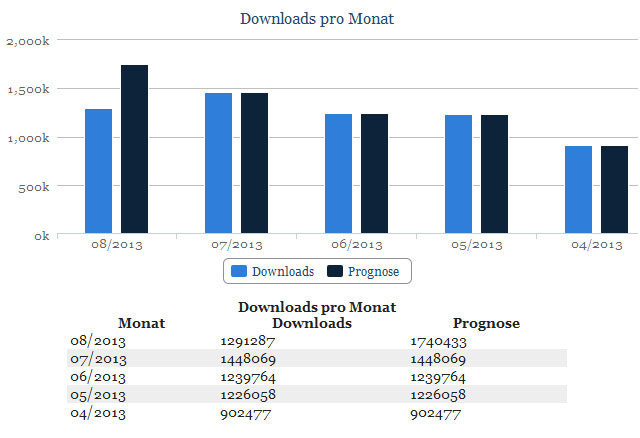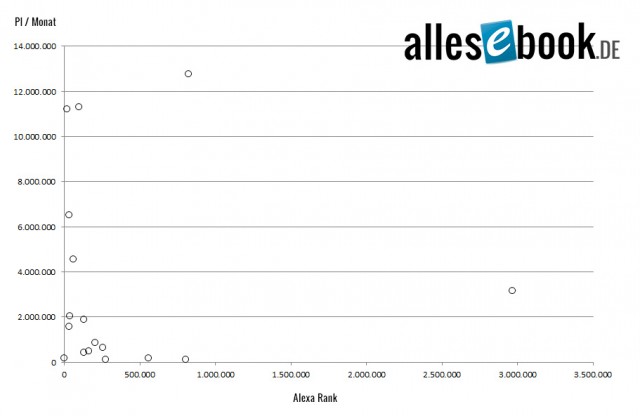eBook Warez Future: How Book Piracy Continues to Evolve Amid Legal Challenges

In recent weeks and months, we’ve extensively reported on the development of various illegal eBook offers, with our main focus being the platform b***.to, not least due to its significant media presence. Since our last article, much has changed, making it interesting to take a look at the sometimes turbulent events and developments of recent weeks.
A Brief Look Back at 2013
A quick recap: The platform b***.to saw rapid growth in 2013, recording almost 2.5 million downloads in September according to its own statistics. While this number is not a major concern for the overall book market, it is quite alarming in relation to the eBook market as a whole. The trend is particularly displeasing for individual indie authors who are increasingly turning to the digital market. There was also a claim on the Buchreport blog that the download and access numbers from b***.to were fabricated. However, this was largely debunked in an analysis on our part.
For comparison: In the whole of 2012, 12.3 million eBooks were sold in Germany. The forecasts for 2013 are even higher, but monthly download numbers in the millions at an illegal portal are by no means negligible.
Due to high demand, b***.to, which initially relied solely on voluntary donations from its visitors, introduced a mandatory usage fee in October 2013. According to their statement, this fee helps eBook pirates purchase more eBooks to offer (illegally) for free online and finance the server architecture. As expected, download numbers have significantly dropped, but with an estimated 1.4 million downloads in November, they remain at a high level.
When the usage fee was introduced, Spiegelbest, the public voice of the portal, unexpectedly bowed out and parted ways with b***.to. According to his own statement, the massive cash inflow to the portal was the reason, being a bit more intimidating than originally expected. After all, Spiegelbest was the press voice of the portal and managed to generate significant attention repeatedly.
Embarrassing Investigation Error
The fact that authorities and rights holders primarily targeted Spiegelbest is highlighted by a bizarre case of prosecution recently revealed. In June 2013, there was a house search based solely on the name and email address of the accused.
In his blog, Spiegelbest clarified how this happened: He uses pseudonyms for his illegal activities, simply choosing names from the phone book. His names continuously change, and it seems that at some point, the unnamed accused was unfortunate enough to have the name Spiegelbest chose, a name that apparently existed only once in all of Germany. The law firm Waldorf Frommer, which represents numerous publishers, seemingly looked up that email address (firstname.lastname@gmail.com) in the phone book and found only one person.
Clear case: That must be the operator of the biggest illegal eBook portal, right? The authorities were set in motion and received the go-ahead from the judge for the house search. Alas – nothing was found. Not surprising, since who would be so foolish as to run the biggest illegal eBook portal under their real name? The situation becomes even more absurd when considering how cautiously the b***.to operators use the Tor network.
It’s disturbing to see how investigations are conducted here. Both private individuals (apparently, not much is needed for a search warrant?) and rights holders must seriously question what this is all about.
The video below describes the situation again.
GVU Collaboration on the Brink?
There are still no breakthroughs in investigations, leading to inevitable questions about the sense in continuing to invest money in various services to chase these portals. Apparently, some publishers are considering this question. According to a report by Buchreport, the collaboration between the Börsenverein and GVU is on the brink.
The goal of 100,000 euros to fund GVU activities for the Börsenverein was missed, as interest waned, and ultimately only around 20 publishers officially engaged in the collaboration. What’s more, a rumor circulated that the GVU had filed a complaint against Tagesspiegel and Die Zeit for printing an interview with Spiegelbest, where the platform’s name and address were clearly visible. The complaint generated much more attention than the interviews could ever have by themselves.
However, the GVU wasn’t responsible for the complaint, which was later clarified: “Filing complaints against journalists or other persons in the publishing sector for published interviews with operators of copyright-infringing internet platforms and/or solely citing the URL of such websites is not within the GVU’s field of activity. The GVU does not hold the legal view that simply naming the URL of a copyright-infringing website in a journalistic article constitutes an act of aiding and abetting copyright infringement, nor does it consider such complaints to be effective. The GVU highly values critical reporting.”
It remains unclear how the collaboration between the GVU and the Börsenverein will proceed.
Pirates Pirated
There have been changes not only among pirate hunters but also among book pirates, which could ultimately weaken b***.to’s position. Specifically, a leak of the entire b***.to eBook archive. You read that right: a package containing around 40,000 eBooks collected by b***.to and offered illegally for download was made available for download on other sites.
Why is this significant? Because b***.to charges a usage fee to access the book archive, as mentioned earlier, while the complete package was available for free download. This could negatively impact the platform in the long run—both because eBook collectors no longer need to go there (and pay), and because others could use the archive to build similar platforms.

Growing download statistics of the portal until August 2013, but how much is the actual damage?
The actual damage to rights holders is likely limited—for a simple reason: private individuals who downloaded the package will probably never get around to reading all those eBooks in their lifetime.
Resistance (DRM) is Futile
The example of b***.to clearly shows that no one is safe from piracy on the internet—not even the pirates themselves. As colleague Ansgar writes on his website quite correctly: “E-Books on the net, in case of doubt, belong to no one, not even the pirates.”
Publishers should therefore question the wisdom of continuing to rely on DRM. eBooks are always pirated, just like any other pay-for digital content. There is no effective protection against it. Instead, DRM only worsens the experience for honest buyers, who have to deal with issues like device authorization and hacker attacks.
Even book pirates fall victim to their own activities. There’s no remedy for it—except, of course, improving one’s own offerings. Google’s Piracy Report also makes it clear that piracy is primarily combated with one’s own offerings, not with warnings, restrictions, etc.
“Piracy often arises when consumer demand isn’t met by legal offers. As services from Netflix to Spotify to iTunes show, the best way to combat piracy is to create better and more convenient legal services. The right combination of price, convenience, and stock will yield far better results in reducing piracy than enforced restrictions,” the Google report states.
And if you don’t believe users and bloggers, perhaps it’s time to at least believe the most important internet company, which after all is capable of capturing and evaluating virtually all user movements in the Western world.
To answer the question posed in the title: The book pirates aren’t going anywhere. Not even if b***.to is shut down. Their eBook archive is now circulating on the internet.

